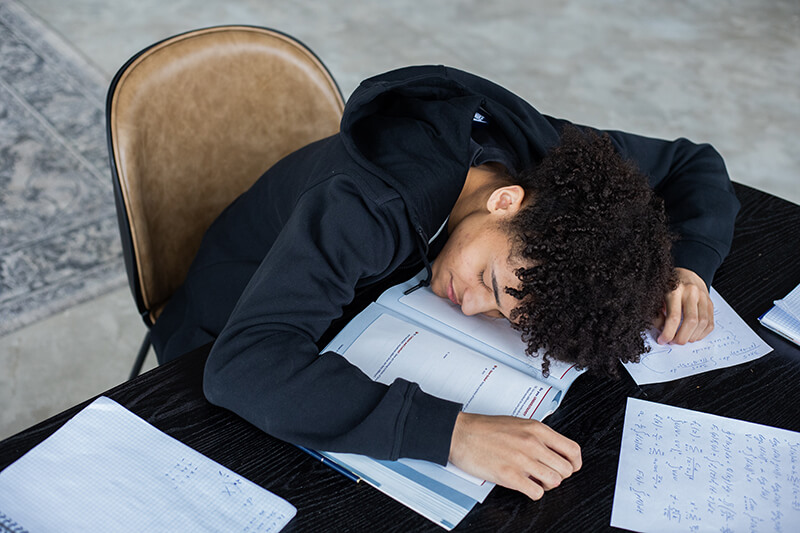
Burnout Syndrome in College: A Guide For Exhausted Students
 If you’ve ever felt so stressed and exhausted you wanted to give up on everything, you have likely suffered from burnout syndrome. This isn’t just your typical stress from schoolwork, either. Burnout can be extreme and cause some serious consequences like depersonalization, lack of motivation, and severe depression.
If you’ve ever felt so stressed and exhausted you wanted to give up on everything, you have likely suffered from burnout syndrome. This isn’t just your typical stress from schoolwork, either. Burnout can be extreme and cause some serious consequences like depersonalization, lack of motivation, and severe depression.
Often, emotional exhaustion, stress and burnout can creep up on a student without any warning, and sometimes it can be too late to recover. It has the potential to cause students to give up on their dreams and consider dropping out of school entirely.
Understanding what burnout is will help you recognize when it’s time to take a step back and get some help. Like many conditions and illnesses, it’s a lot easier to help yourself get well if you don’t wait until it’s too late.
Burnout syndrome is a plague that can wreak havoc on any university or college student’s life. However, understanding the signs and symptoms of burnout can help you reduce your risk and keep yourself healthy.

What is Burnout Syndrome?
Burnout syndrome is a condition usually associated with intense, long-term stress and exhaustion. It most commonly occurs in individuals who are in stressful environments where the stress is not being managed properly, or where individuals are not managing their stress properly.
Ultimately, burnout is the consequence or condition that happens when you let the stressors in your life pile up and don’t manage or keep an eye on your stress levels. When you run yourself into the ground trying to keep up with your work, your part-time job, your social commitments, and anything else you have going on, you could end up with severe stress and exhaustion in the form of burnout.
While it might seem like a newer concept, the term burnout was actually coined in the 1970s by a psychiatrist named Herbert Freudenberger. His original use of this term was applied to people working in professions that come with a high risk of emotional exhaustion from helping people, like nurses, doctors, and caregivers. Nowadays, it’s applied across the board in all types of professions as well as in college and university programs.
Burnout Syndrome in College and University
Student depression and anxiety is a major issue on most campuses in North America. While many students experience the best years of their lives at school, many experience severe stress and exhaustion during this time as well.
When you leave for university or college, you’re starting a new life. Often this happens in an entirely new city, state, province, or country. You might not know a lot of people there, and you might not really have any preparation for the workload you’re about to face. In fact, you might not have any preparation for any of the things you’re going to encounter during your academic career. When the work and assignments start flooding in and you feel overwhelmed, that’s when burnout likes to creep in.
Burnout is common in students who are taking work-heavy courses or programs, such as medical students or law students. In these types of “helping” career paths, one little mistake can severely and even fatally impact the lives of others, causing immense pressure for the individual in that position. As a result, burnout is most common among those areas and fields.
However, burnout could happen to an English literature major just as easily as it could happen to a nursing student. It all depends on how you personally manage stress, what your work-life balance is like, and how much work you’re putting in without any self-care checks.

The Aftermath of a Global Pandemic: COVID-19 Burnout
We can’t really talk about burnout in 2021 without acknowledging one of the biggest factors that is leading to burnout in students and professionals alike: COVID-19. In the early months of 2020, the world shuttered itself as a global pandemic swept the nation, flipping our lives as we know it completely upside down.
Now, over a year later, students have returned to in-person classes carrying one additional source of exhaustion and stress: COVID-19 burnout. Dealing with the emotional exhaustion of a pandemic that has caused millions of deaths and illnesses across the world is not an easy burden to bear, but it’s one everyone has unexpectedly gained.
Many students get hit hard from burnout, but it is especially prominent at this time when the world is experiencing COVID-19 fatigue and slowly returning to normal after a long period of stress brought on by the pandemic. It’s not just students, either. Global News recently published a survey about COVID-19 burnout in the workplace, and both employees and employers are facing pandemic-induced exhaustion across the board.
Knowing that there is already a big risk factor in place during this first year back on campus should be a good indicator that all students should pay attention to their health and wellbeing. Burnout isn’t easy to come back from, and now more than ever is the time to be cautious.
Is Burnout a Psychiatric Disorder?
Burnout syndrome is a real psychiatric disorder. It has been officially recognized by the World Health Organization (WHO) as an occupational phenomenon, so it isn’t on the official list of medical conditions, but in a clinical setting it can be diagnosed by a psychiatrist.
It’s clinically diagnosed using a scale called the Maslach Burnout Inventory (MBI), and the Maslach Burnout Inventory- Student Survey (MBI-SS). The MBI-SS is used specifically for students because it focuses on factors that impact students directly, while the MBI is generally used for workplace and occupational burnout.
Both the MBI and the MBI-SS contain questionnaires that utilize 3 main dimensions in testing those with burnout:
1. Exhaustion: Emotional exhaustion in particular goes beyond simply being tired. When you’re exhausted, your mental energy is completely drained and you feel as though you’re in a constant state of overwhelm and stress for an extended period of time.
2. Depersonalization: This occurs when you develop an indifferent or distant attitude towards work, school, and the other things in life that you normally care about.
3. Reduced Personal Accomplishment: Typically this occurs when you start to lose focus on your work, your grades start to slip, and you feel like you’re getting nowhere in your studies or course.
Each dimension has its own set of items and factors that are used to assess a patient’s condition. It’s best to consult a psychiatrist in order to make a conclusion about your own personal condition, especially if a lot of the symptoms and factors in this article relate to you.

Risk Factors of Burnout in College and University Students
Depending on your own life, there are a variety of reasons and risk factors that might impact your susceptibility to burnout. If many of these are in your life already, you could be towing the line closely without realizing you’re at risk.
Here are the most common risk factors for burnout in university and college students:
● Low self-esteem or self-confidence
● Setting unrealistically high expectations for yourself
● Struggling with finances or money
● Limited access to supportive resources
● Inability to cope with stress properly or not being “good under pressure”
● Programs or courses with a heavy emotional toll, like nursing or palliative care
● High-pressure courses or work environments
● Taking on many commitments in and outside of school
● Having a type-A personality or being a perfectionist
The Consequences of Emotional Exhaustion and Burnout Syndrome
When you suffer from burnout, you’re not just a little tired and you can’t really recover by taking a nap or drinking some extra coffee. Most of the time, burnout is chronic and the effects can last for a long time, placing severe limitations on your life and your wellbeing.
Burnout consequences come in both mental and physical forms. What many people don’t realize is that suffering mentally can lead to serious physical problems. The entire body is controlled by the brain, so when the brain is dealing with burnout, the rest of the body is undoubtedly going to feel the impact.
Mental and Emotional Consequences of Burnout:
● Dropping out of school
● Severe depression
● Post-traumatic stress disorder (PTSD)
● Substance abuse
● Chronic feelings of hopelessness
● Suicidal thoughts
● Withdrawal and/or isolation
Physical Consequences of Burnout:
● Insomnia or interrupted sleep patterns
● Chronic headaches or migraines
● Frequent illnesses due to low immunity
● Gastrointestinal issues (stomach and digestive problems)
● Tense muscles or muscle pain
● Changes in appetite

What Are Burnout Symptoms? Signs You Should be on The Lookout For
Everyone experiences burnout syndrome in their own way, but there are some common signs and symptoms you can keep an eye out for to help be proactive and prepared.
Here are some of the most common burnout symptoms in students:
● Letting your work pile up to the point where it becomes unmanageable
● Loss of motivation
● Low energy levels
● Procrastinating more than usual
● Skipping class more often
● Emotional and mental exhaustion
● Decreased academic performance
● Feeling like every day is a bad day
● Pulling all-nighters to fit in more work or study time
● Increased frustration and irritability
● Inability to feel happiness or joy
● Isolating yourself from friends or family
● Feeling cynical about everything
● A sense of dread when you go to school or work
If you start to feel like all of these things sound very familiar, you may be suffering from burnout. Keep reading to learn what you can do to prevent things from getting worse, and how you can help yourself become well again.
What Are the 5 Stages of Burnout?
According to psychologists, there are 5 stages of burnout. These 5 stages were defined in a study conducted by Winona State University and are as follows:
1. The Honeymoon Stage: This is the beginning stage, where you’re starting out at school or work and have high energy, excitement, a positive attitude, and you’re eager to do well. In this stage, it’s important to develop good coping mechanisms for stressors that arise. If you don’t, you may continue on to the next stage.
2. The Onset of Stress: In the second stage, you start to feel those stressors hit you a little harder and you are beginning to recognize that you’re losing some of that positive energy you started with. At this point, you haven’t lost motivation entirely, but some of those burnout symptoms are definitely coming to your attention.
3. Chronic Symptoms: In this third stage, those burnout symptoms you were starting to feel have now manifested into chronic and ongoing forms. They may become unmanageable, and more symptoms might start to add to the mix.
4. Burnout: This stage is the official recognition that you are suffering from burnout. At this point, you likely haven’t been able to manage stress and exhaustion effectively, and those chronic symptoms are getting in the way of your life both in and outside of your work.
5. Ongoing Burnout: In this last stage, burnout becomes chronic. This is where things can get dangerous. At this point, the burnout symptoms you’re experiencing might become so ingrained in your life they have become embedded in your personality, and you are now in a state of emergency.
Realistically, if you manage your stress levels properly, you might never have to worry about moving beyond the first stage of burnout. However, if you start hovering around the next stage, that’s the best time to seek help or do something to keep yourself in check.

15 Tips For Reducing Your Risk of Burnout Syndrome in College
1. Reduce the stressors in your life that you can control. Some stressors in life are out of your control, like bills and assignments, but others are within your control. Cut out anything you can that isn’t adding something positive to your life, like that negative friend that’s always dragging you down.
2. Limit your time on social media. This is not only a way to keep yourself on track, but it’s also a way to reduce stressors in your life you may not have known were there. Social media has its good and bad sides, but it can be dangerous when you’re in a vulnerable position.
3. Listen to your body. Are you starting to feel the exhaustion setting in? Maybe you’re getting some muscle tension and you aren’t sure why. All of these things are your body telling you what it needs. Listen to it.
4. Develop good study habits as early as possible. Good study habits will help you avoid stressful and exhausting last-minute study sessions and all-nighters. Read our blog on how to study effectively if you need some techniques to try.
5. Set better boundaries. You might need to learn to say “no” every once in a while, but it’s important to understand how to prioritize your life in order to stay on track and manage everything that’s going on.
6. Work on your time management skills. The better you can balance or manage your time, the better you’ll be able to stay on top of your schoolwork and prevent it from piling up. A good work life balance is an important factor in reducing burnout.
7. Keep a positive attitude. One of the biggest burnout symptoms is cynicism and feeling pessimistic all the time. Staying positive helps you beat those feelings. Try practicing some positive affirmations to keep yourself optimistic and confident.
8. Get more sleep. It’s very common for college and university students to be up at all hours and get little to no sleep on a regular basis. While this might help you fit in all your social activities, it can be extremely dangerous to your risk of experiencing burnout. Prioritize getting at least 7 hours of sleep a night and your physical and mental health will thank you.
9. Lean on your friends and family. Having a close support circle that includes friends, family, and colleagues is very important in preventing burnout and supporting your overall wellbeing. Keep in contact with them as often as you can.
10. Learn to budget your money. One of the biggest stressors many college students face is living on a student budget. For some more advice on this, read our blog on 25 ways to save money in college.
11. Monitor your intake of mood-altering foods and substances. Caffeine, nicotine, alcohol, and unhealthy fats can all have an impact on your anxiety levels, depression risk, and cognitive thought patterns.
12. Take care of your physical health. Exercise as often as you feel comfortable and eat a nutritious diet to give yourself the right fuel to take on those stressors. This will also help prevent some of those physical consequences we discussed earlier.
13. Prioritize your self-care routine. Even just adding a few little self-care tricks here and there can make a world of difference for your health and wellbeing – 2 important factors in preventing burnout.
14. Rethink the way you look at work. Find some value in what you’re doing and focus on why you’re here. That essay you’re dreading is an important piece in you accomplishing your career goals. Changing your mindset like this makes more of a difference than you realize.
15. Do something meaningful. Lack of fulfillment is a big symptom of burnout, so doing something that makes you feel fulfilled can help offset those feelings. Try volunteering, joining an extracurricular activity or a club, or even just donating to a cause you care about.

How Do You Treat Burnout? What to do if You Hit Your Breaking Point
It’s one thing to protect yourself from burnout syndrome, but it’s also possible you might not realize you’re burnt out until it’s too late. Being proactive and preventing yourself from getting burnout is a lot easier than recovering when you already have it. That being said, it is possible to reverse the damage burnout causes if you’re willing to make the effort.
Here are some things you can do to pick yourself back up if you hit your breaking point and succumb to those burnout symptoms:
● Step back and take a break. Even if it means taking a semester off from school. If things are getting really bad, the work you’re going to produce while you’re burnt out isn’t going to be to the best of your ability anyway. Taking a break or a breather will help you focus on yourself so you can get back to your future.
● Get professional help. It’s always a good idea to seek help when you’re deep in the throes of burnout. You should never feel ashamed about talking to a peer, your school’s guidance counselor, or even a therapist. Just talking about how you’re experiencing burnout can be helpful to get things off your chest and discover new ways to cope.
● Work on improving your stress management skills. Try to find new ways to become more resilient when the pressure is on, even if it means working with a professional or doing a bit of extra research for coping mechanisms and ideas.
● Relax. Often, stressors that lead to burnout cause us to forget that we need to unwind from time to time and relax. This downtime is an important way to reset your brain and start fresh with a new attitude and mindset.
● Do something creative. Exercising the creative side of your brain is a productive release from the things that are causing you severe exhaustion. Everyone should have some kind of creative outlet that helps them cope with stress.

Use an Essay Writing Service to Help Reduce Those Burnout Symptoms
If you’re suffering from burnout and all of your schoolwork is piling up, one of the easiest ways to help you recover is offloading some of those assignments to a professional. This way, you can make sure your grades stay where they need to be and reduce some of the major stressors in your life at the same time.
At Homework Help Global, we have a team of academic essay writers on hand and ready to handle even your toughest assignments. Our core goal is to help you secure your future while enjoying your time at school, and prioritizing your wellbeing should be at the top of your to-do list. From custom written essays to PowerPoint presentations, we can help you with any assignment, in any course, at any time.
Use our online ordering system to order your next essay or assignment now, or get a free quote from our operations team.
Share:

